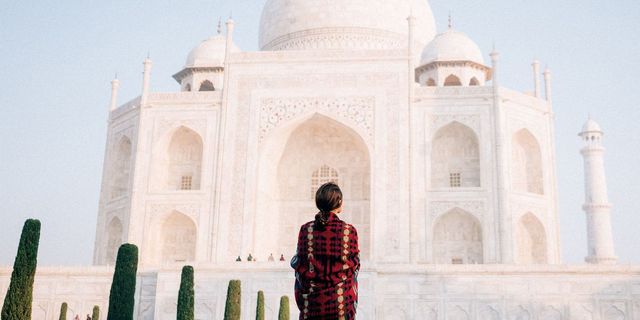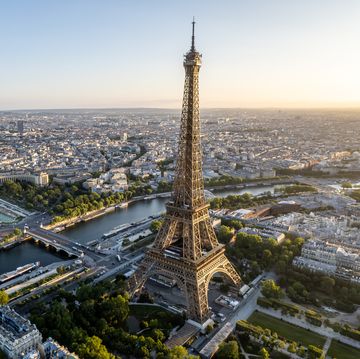Four years ago, I traveled in India during the country's celebration of Holi. When I walked on the street to join the festivities, a group of men approached me, yelled "Happy Holi!" and then spread bright colored powder across my face, as was the tradition. But then, as I wiped away some of the powder near my eyes, they snuck their hands underneath my elbows and grabbed my breasts. I stood there, feeling it happen yet totally frozen, incapable of even opening my mouth to scream.
Throughout the first hour of the festival, this happened again and again: "Happy Holi," powder on my face distracting me, then a man squeezing my breast or pinching my nipples. The last time it happened, a group of men surrounded me against a wall, and ultimately, I found myself on the floor, arms across my chest, trying to kick them off as they kept peeling apart my arms and sliding their hands up my shirt.
It took me many years to call this experience "sexual assault."
Why? For one, it happened during my year traveling abroad, the belated "gap year" I had decided to take after quitting my job, ending a relationship, and leaving everything from my so-called "normal" life behind. My experience went against the living-the-dream narrative so often associated with adventuring abroad. I didn't feel that I had permission to have bad experiences during my year traveling. This was what I had saved for years to do. I was supposed to be having the time of my life.
I hid my story because I didn't want to answer what I knew so many would ask: "Why didn't you say something? Why didn't you yell? Why did you let it happen again and again?" I felt shame for being silent. As someone who had always thought of myself as strong and assertive, I couldn't believe my response when it really mattered.
Later, I would read studies reassuring me that "freezing" is a common—and totally natural—response to sexual assault. But over time, I also realized that much of my silence in the moment of my assault also came from cultural confusion.
There's a certain sense of invalidation that comes with traveling that suddenly places all experiences up for cultural debate. A personal violation can send a traveler into a flurry of cultural questioning: Is this normal? Is this just the way things are here? Am I allowed to get angry at this? Or am I supposed to tolerate it?
A friend of mine who was sexually assaulted by a hotel owner while traveling alone in Turkey also doubted herself after the incident happened: "I wondered if I had overreacted," she told me under the condition of anonymity. "Perhaps this was a different cultural context and I had interpreted something that was intended to be harmless as something else? Traveling alone also meant there was no one to turn to in my immediate surroundings to validate my own feelings."
Things become even more confusing when locals challenge what constitutes a violation in the first place. When my friend in Turkey confronted the hotel owner who assaulted her, he told her he had "been in the business for 24 years" and it was all "just friendliness." Particularly in cultures known to value physical affection, some men can rationalize inappropriate physical contact as just standard flirtation. While in Cuba, when I told a man about the sexual assault allegations brought against Donald Trump, he told me "Your definition of sexual assault is different in the U.S. than what we have here in Cuba." Hearing commentary like this confused me further: Is a woman's reaction to assault universally valid, or can it be simply a "cultural difference?" Was "sexual assault" negotiable based on country and culture? Was my definition of it "American"?
Sometimes people also insinuate that a violation only happened because as a foreigner, you did not adhere to a country's cultural norms. When another friend from the U.S., who also requested anonymity, was sexually assaulted by two men in Cuba, many of her friends suggested it happened because she acted "too open" around men, and gave off the wrong message. It was an argument I would hear often while traveling: Western women are too independent, too bold. If we acted more modest and reserved, none of this would happen.
In India, knowing these stereotypes of Western women, I acted accordingly: I wore baggy pants that covered my legs. I went to the Holi festival sober. I went to the festival with my boyfriend at the time. As long as I did these things, locals told me I'd be fine. "Just keep your boyfriend close," they'd say, and "Just be careful."
At first, I was angry that I had played by all the rules and had been assaulted regardless. But do female travelers really have to oblige a culture's rules in order to earn their own basic personal safety? At what point was the idea of following a culture's social norms respectful, and at what point was it used as an excuse for victim-blaming?
Erin Epperson writes in her blog Traveling While Female, "As foreigners it is certainly our responsibility to 'be aware of how to behave and live in the local culture.' But that does not mean that if we experience violence (as harassment and attempted sexual assault are), that this too is our responsibility."
Still, the two common narratives available for female travelers who have experienced assault abroad is either we deserved it for not following cultural rules, or our experience wasn't "culturally" considered assault to begin with.
Unfortunately, the alternative narrative available for Western female travelers is problematic. Even when others believe and validate our experience, as Western women assaulted in a non-Western country, our stories reinforce the xenophobic assumption that non-Western countries (and men) are somehow inherently more dangerous. A few months after my experience, another female traveler wrote an essay for CNN detailing her sexual assault in India. The essay went viral, but also received substantial criticism from women of color who questioned the fairness of an American, white woman telling stories of sexual assault that portrayed an entire country from just one angle. One writer argued:
"This focus on what happened to one individual on a study abroad trip to India makes it seem like no woman can enjoy a trip to India and that she would be ultimately safer in America. We must be aware of the rapes that occur worldwide, but we also need to internalize the fact that rapes in our country happen on college campuses, in cities, and in other unimaginable social situations. And people of many different ethnicities and racial backgrounds commit these acts."
As a Western traveler, admitting to an incident of sexual assault felt like it created a broad generalization of an entire country. And yet, did that mean I shouldn't talk about the incident at all?
Others have noted that when Western women share stories of sexual assault abroad, the public takes these stories far more seriously. When the white, British travel blogger Lucy Hemmings' blogged about her experience with sexual harassment in India, her story went viral in Indian media, and hundreds of Indian men contacted Hemmings through the internet to apologize on behalf of their country. This led writer Beejoli Shah from The Daily Dot to ask "Why does a non-native white blogger need to write a blog post about sexual assault for it to go viral amongst men in the country?...This problem isn't endemic only to foreign visitors to the nation. The fact that it took a white non-Indian female reporting sexual assault to elicit hundreds of responses from Indian men is disturbing, to say the least."
Thus, sharing experiences of sexual assault abroad becomes a complicated exercise in intersectional feminism. As a Western woman, I have a responsibility to tell my story carefully. I have to balance the weight of both the male privilege I lack and the Western privilege I have. I have to both legitimize my experience in India, while also acknowledging that it was an experience that just as easily could have happened at a white, upper-class fraternity party in the United States. And I have to acknowledge that as an American, my privilege gives my story a specific kind of narrative power that other women around the world don't necessarily have.
Though I have met so many women who have experienced sexual assault abroad, I rarely see writing or hear conversations that fully reflect these nuances in their experience. I rarely read or hear about how issues of culture, race, and privilege influence both the validation of sexual assault, and the way we tell its story. I rarely read or hear about how we can manipulate "culture" to delegitimize a woman's experience, or to value one woman's experience over others. And meanwhile, I rarely see travel media portray travel as anything other than some inherently idyllic experience, which makes it harder for women to speak honestly about these stories in the first place.
Through my years of traveling and living abroad, I know that travel can both empower and oppress, both liberate and restrict. It can provide a woman with the most enriching, meaningful moments of her life, as well as her most devastating ones. As we continue to tell our travel stories in the future, I hope we can begin to allow space for both.













